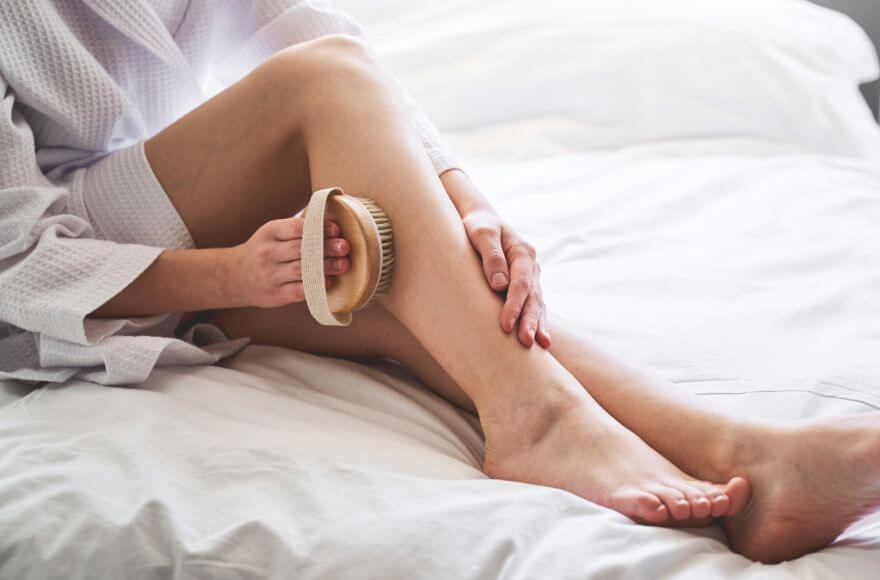Your Cart is Empty
INFO

How To Use A Safety Razor
March 29, 2022 7 min read
In 2018, almost 5.5 million people in the United Kingdom used disposable razors. It doesn't take much to figure out that a large volume of plastic is used and subsequently discarded each week. While there is no talk of outlawing disposable razors (like the ban on plastic straws, drinks stirrers, and cotton buds), it is something that should be considered. The disposable razor market is a massive one.
They are frequently offered in needless blister plastic packaging. This type causes significant 'wrap rage' due to their near-impossibility to open without a tiny toolbox and inhuman amount of patience.
The alternative is to use a safety razor, which many people find a scary idea? Won’t you get far more knicks and cuts? How can it ever give you a smooth shave? Won’t it be unsuitable for different areas of my body? The benefits of using a safety razor outweigh any misconceptions you might have heard, and, in this blog, we talk about how great safety razors really are and how easy it is to switch to a safety razor, stopping more plastic razors from being purchased and tossed into the landfill.
Why A Safety Razor Is Better For The Environment
Even though they are not classified as "single-use," billions of plastic razors end up in landfills every year. Razors are sharp devices that can't be recycled because of the mixed materials they're built of. A typical disposable plastic razor lasts three to ten shaves before becoming blunt and clogged, and then it's off to the garbage. Buying new razors regularly generates more waste from plastic and cardboard packaging. On top of this, the manufacturing process is complex and costly. It all adds up to disposable razors creating a significant burden on the environment.
Double edge blades (always made from stainless steel) can be manufactured very efficiently compared to engineering the components used to assemble blades in plastic cartridges. The blade is the only part of a safety razor that needs to be disposed of.
Each part of the country has its own policies regarding recycling. Be sure to check where certain materials are accepted in your area.

Shaving With A Safety Razor
Today, safety razors are gaining popularity with both women and men for a whole host of reasons. They offer a much closer shave, cause less skin irritation, as well as being significantly kinder to the environment.
Many people are apprehensive that using a safety razor would result in a few cuts and nicks, because of the sharpness of the blades. When in reality, a sharp safety blade is significantly less likely to cause damage than a blunt disposable cartridge. All you have to know is that safety razors demand a unique technique that is simple to learn. Always keep the razor at a 45 degree angle against your skin and go slowly. There's no need to exert excessive force.
In fact, multi-blade cartridge razors can be more dangerous than a safety razor as more blades mean a greater chance of cutting yourself. As each blade passes over the same strand of hair multiple times and goes lower each time, the risk of knicks and cuts increases. With a safety razor, the hair is cut once at skin level instead of below skin level like with cartridge blades.
If you are concerned about using a safety razor, we suggest starting by shaving your legs first so you can be sure you are happy you have the hang of it. Once you’ve mastered the legs, you can progress to more challenging areas. Knees, underarms, bikini line, and face – the unisex safety razor can be used in all locations. If you’re feeling nervous, you can choose to shave whilst soaking in the bath or sit down in the shower for more stability.
Are Safety Razors Suitable For Sensitive Skin?

A safety razor might be the perfect solution for sensitive skin. Some dermatologists believe that a double-edged safety razor is less likely to cause skin irritation than alternative multi-blade razors. A series of three, four, or five blades is more likely to irritate skin than just one sharp blade. Safety razors are less likely to cause ingrown hairs too.
Using a high-quality shaving soap will reduce the risk of irritation too. Of course, it’s possible to shave without any soap, but it’s certainly not recommended.
How To Shave With A Safety Razor
When you shave with a safety razor, you may have to adopt a slightly different technique than you are used to with a cartridge razor to get the best results. Follow these simple guidelines, and you’ll get a beautifully close shave with no irritation, knicks, razor bumps or ingrown hairs.
Preparation is everything

Pre-shave, prepare your skin by washing it thoroughly with a cleanser, exfoliating it, and applying shaving cream.
If you’re short on time, you can streamline the process by taking a nice hot shower and scrubbing the area you will shave to remove dead skin cells. Then all you’ll need to do is apply shaving cream.
Exfoliating is especially recommended when you are shaving larger areas, like legs. One of the leading causes of ingrown hairs and razor bumps is when your razor pushes dead skin cells into a pore, blocking the follicle. Plus, when you let your skin soak in hot water, it helps open up those pores, making shaving easier.
Ensure you are using a fresh razor blade
A new blade always results in the best shave, especially when using safety razors. Sure, staring straight into the gleaming, sharp edge of a new blade may seem intimidating at first, but, remember, you're more likely to cut yourself with a dull one.
The best technique for shaving with a safety razor
After thoroughly prepping your skin and hair for the shave, hold the razor at a 45 degree angle to your skin and shave using short, soft strokes.
Allow the razor's weight to do most of the work; you won't need to use as much pressure as you would with a cartridge razor. This offers you control while allowing the razor to glide due to the handle's weight. It's important to remember that you shouldn't use pressure when you shave with a safety razor. You don’t need to!
Shaving ‘with the grain’

If you're experiencing any irritation, try shaving "with-the-grain" or in the same direction that the hair grows. This will give you a much gentler shave while still achieving the same level of closeness - it will just take a few more passes. Irritation can also indicate that more lather is needed for the skin and hair.
Let the blade do the work
We recommend that you let the blade do the work. Don’t push the blade into your skin and opt for a gentle touch that lets your blade do most of the work of shaving instead.
Use shorter strokes
In TV adverts, you'll see someone pulling a razor blade up the entire length of their leg. We don’t recommend that. Even with a cartridge razor, that's a quick way to cut yourself. With the safety razor, shave just a few inches at a time using short strokes, and take extra care going around uneven areas like your ankles and behind the knee.
Pass over the hair twice - Start by shaving along the grain on the first short pass. Then when you’ve covered the whole area, you want to shave, re-lather and make a second pass in the opposite direction for the smoothest shave.
Shaving sensitive areas like the bikini line
When shaving around the bikini area, pull your skin taut and make sure you are shaving with the grain in the direction the hair grows. Tight skin allows the blade to flow smoothly. If you've never tried it before, you can try positioning yourself in a squat. Squatting tightens the entire area (and conceals anything you want to avoid nipping). The main thing to remember is that shaving your legs and bikini area isn't all that different from shaving a face.
And a safety razor will give you the clean, smooth feeling skin you've been wanting. So just have some patience and take your time when you’re first learning to use one.
Rinse and treat with aftershave balm or moisturiser

Once you’ve achieved the desired finish after your first and second passes, the final step is to rinse your face with cold water to close your pores. This prevents other debris from getting stuck in them, helping to avoid ingrown hairs.
Afterwards, pat your face dry with a soft towel and apply a generous amount of aftershave balm or moisturiser to keep your skin nice and smooth.
How To Dispose Of A Safety Razor Blade
It's possible to recycle safety razor blades because they are made entirely of metal. You will need to check with your local authority on what can be recycled, but most places in the UK will make it convenient for you to recycle your safety razor blades. You can then take them to your local recycling centre and place them into the scrap metal container. Visit your local authority's website to find your local recycling centre.
The most efficient way to dispose of these blades is to collect them up and place them in a recyclable disposal tin, and then all of your blades can be recycled in one go, making it safe and convenient.
Depending on your local recycling authority, you might even be able to put this straight into your plastics and metals wheelie bin - it’s worth checking.
Wild And Stone’s Reusable Stainless Steel Safety Razor

Wild & Stone’s reusable stainless steel razor has been created for women or men looking for a smooth and comfortable shaving experience and looking to be kind to our planet.
Our metal safety razors have been cleverly designed for use all over the face and body. They have a grooved edge made for a precision wet shave that is both clean and gentle on the skin. The long handle and textured grip allow for a safe shave, even in those hard to reach areas.
Made to be incredibly easy to recycle, just remove the blade and wipe it before putting it to recycle alongside your food cans.
Plastic-free and sustainable, vegan and cruelty-free, our safety razor comes in recyclable, eco-friendly card packaging. Perfect for making the swap from disposable cartridge razors.
Wild & Stone's mission is to create stylish, easy to adopt and usable alternatives to common plastic products around the home. We source all our products sustainably, from raw material to final delivery. Shop our wide range today.
Also in Sustainable Living Blog

8 Tips for a Sustainable Commute
June 29, 2023 5 min read
The way you get to work can have a huge impact on your carbon footprint, and both you and your employer play an important role in encouraging a greener commute. Learn more here.
Read More
Eco-Friendly Beach Essentials
June 22, 2023 4 min read
By making more conscious choices, we can enhance our beach trip while minimising our environmental impact. In this blog post, we'll explore the top eco beach essentials for your next trip.
Read More
Eco-Friendly Summer Activities for Summer 2023
June 15, 2023 4 min read
From walks on beautiful coastlines to events hosted in your own garden, make the most of the good weather and time spent with your loved ones with these eco-friendly summer activities.
Read MoreMake your inbox a little more eco!
Sign up and save 10% on your first order of 2 items or more.
Keep an eye on your inbox for the latest eco trends, articles, deals and product releases.


